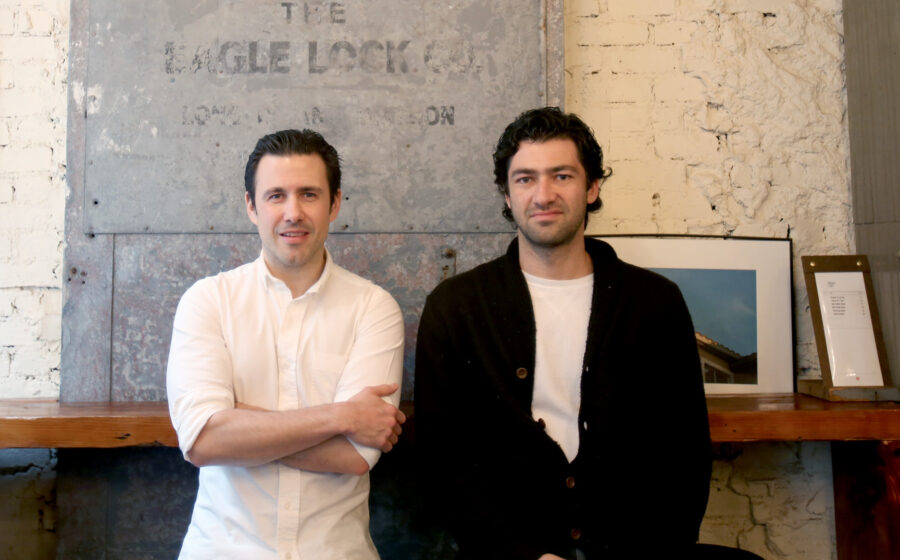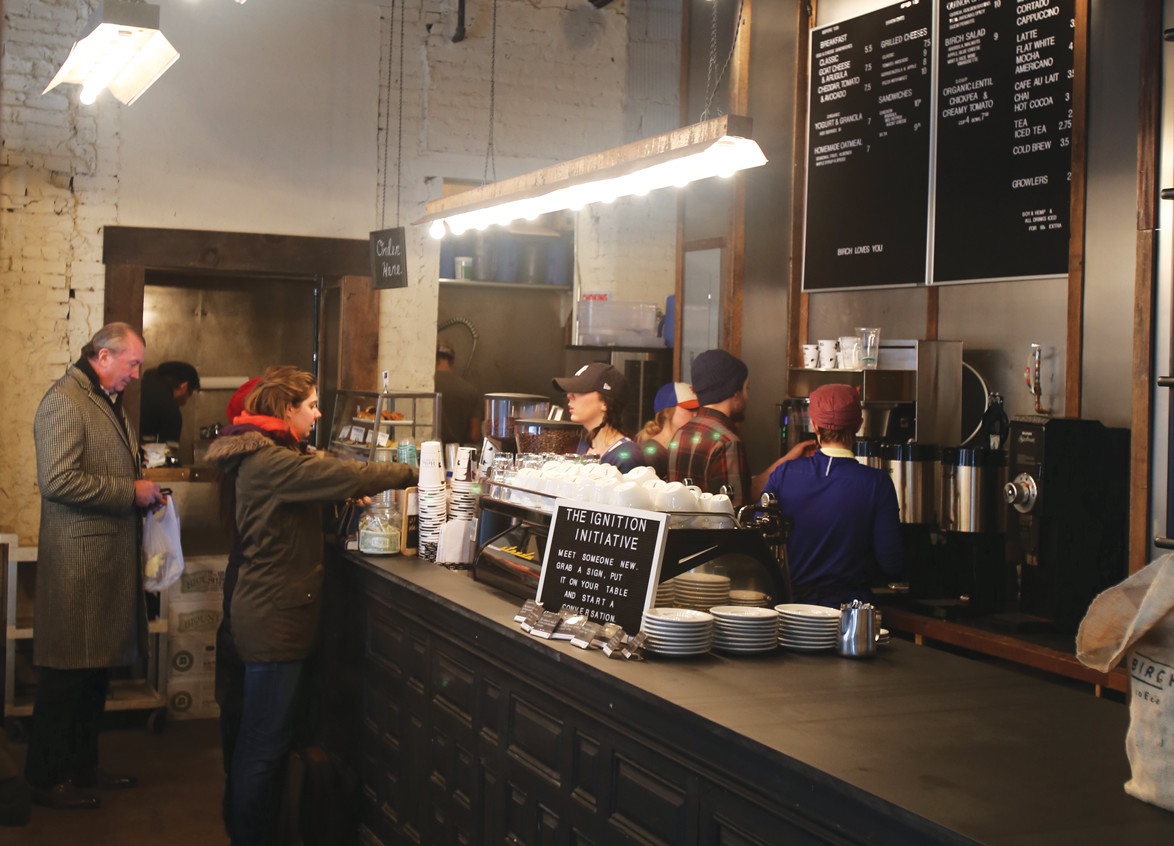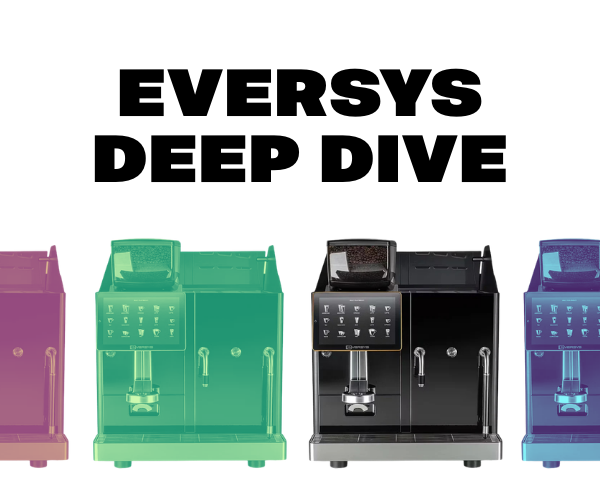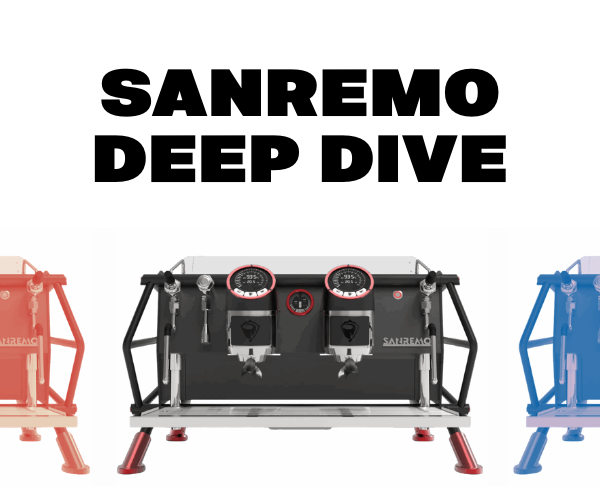[W]alking down the sidewalks of Manhattan, it’s easy to imagine, almost believe, the city is breathing, its buildings lungs and its people oxygen. From block to block, the streets will fill with people and then empty of them in long, easy draughts. Sometimes the city pants, creating a hyperventilated crush on the street. When the city breathes at 27th Street in the Flatiron District it’s a nice and easy in-and-out as people are pulled into Birch Coffee’s main-but-small room and wrapped around a long table and up to the register.
Even when the line goes dozens deep and out the door, the room doesn’t become a bunched up jostle of stress. The deep warmth of wood panels and the cream-colored exposed bricks and the airy ceiling invite calm. The central table, which at first seems an awkward seating spot, acts as a dike to direct the flow and keep customers from standing in are-they-in-line-or-not limbo.
As another group is drawn in, Jeremy Lyman and Paul Schlader, the owners of Birch, sit at the table with me, engaged in our interview but keeping tabs on their staff, ready to hop in if needed. The four baristas hum along, clearly a comfortable team unfazed by a sudden rush. While the table and the décor may be calming, Jeremy and Paul point to the bar and say it’s the source of tranquility: there are no conflicts at their bar, at least none sparked by Birch. The two take coffee seriously, but they’re almost allergic to snobbery.
“I didn’t even know how to brew a cup of coffee when we opened.”
When they started Birch in 2009, they couldn’t have copped arrogance if they wanted to. “I didn’t even know how to brew a cup of coffee when we opened,” says Jeremy. Paul chuckles, shakes his head, then grimaces as he says, “It took us a good year and a half to get a good coffee program.” The two had years of experience in restaurants and bars, though, and so over those first months, in lieu of great coffee, they doubled down on service. “Coffee is our platform,” says Jeremy. “If we were a car shop, that would be our platform and we would do it as well and as nicely as possible.”
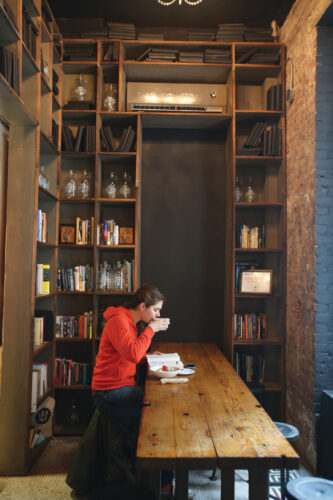
Paul and Jeremy educated themselves fast enough that before a year was out the New York Times cited Birch among its evidence that New York-grown cafés had finally arrived. That gave them a huge boost, even though they were still figuring out coffee, especially their cold brew, which had become almost an obsessive pursuit. “We were chasing this unicorn,” Paul says of it. They’d get things right where they thought they wanted it, then they’d learn or experience something new in cuppings. “We’d come back and say, ‘Stop, we have to change this.’”
It became their signature. Over summers, they delivered it with a custom-built bike, which proved to be media manna: two handsome fellows and a cooler-festooned bike filled with growlers of coffee—the copy wrote itself. A Breaking Bad-style photo of them with their cold brew inspired American Express to make an ad featuring the two and their coffee.
American Express “Birch Coffee” :30 from Edward Einhorn on Vimeo.
This café is the fourth they’ve opened, though this is a replacement rather than an addition. Their first shop’s door is just fifty feet down the street. It was a classic Manhattan postage-stamp-sized place. “At the old space, if you were fifth in line, you were out the door,” Jeremy says. “Other customers would see that and walk by.” For two years they wanted to move, but relocating in this market is as hard as opening a new space. Sixty percent of the shop’s customers visit at least once a day, and Paul and Jeremy didn’t want to lose that loyalty.
“When you hear New York, you don’t think nice. So we’re trying to be New York but also nice.”
Then this 900-square-foot storefront opened and they built the space themselves in eight weeks. Over a long weekend, they made the move and didn’t miss a step. Nothing about the café or the coffee feels anything less than meticulous and well understood. Paul now roasts the coffee, a rarity still among New York cafés.

Jeremy, a native New Yorker, says their approach to Birch, whether it’s the aesthetics, the food (which is killer), the coffee, or the hospitality, is informed by the city, by its value of quality delivered at speed. He just wants to boost one seldom seen attribute.
“When you hear New York, you don’t think nice,” he says. “So we’re trying to be New York but also nice.”
—Cory Eldridge is the editor of Fresh Cup.

